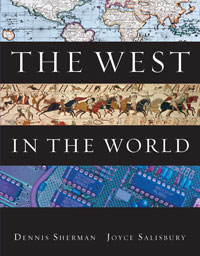 
The West in the World, 4th Edition (Sherman)Chapter 14:
A New World of Reason and ReformCritical Thinking Questions- Questioning Truth and Authority
- How do the Medieval and Renaissance understandings of the universe differ?
- Why did Medieval scholars believe the earth was the center of the universe?
- What new ideas about the world did the Hermetic approach open up for scholars?
- How did exploration during the Renaissance help to disprove traditional assumptions about the world?
- How did the printing press contribute to Renaissance scholarship?
- How did the Reformation help to make Renaissance ideas possible?
- Developing a Modern Scientific View
- What did Copernicus contribute to our modern understanding of the universe?
- Why was the Copernican view of the universe such a threat to church authorities?
- What were Tycho Brahe's contributions to astronomy? How did those contributions lead to further scientific discoveries?
- What did Galileo Galilei believe was the place of mathematics in explaining the universe? What did he contribute to physics?
- Describe Isaac Newton's scientific contributions. How did he build upon past findings?
- How was the scientific method applied to the study of medicine and anatomy?
- How did the scientific method differ from earlier techniques for ascertaining the truth?
- Supporting and Spreading Science
- What role did patrons play in the development and spread of new scientific ideas? Who were these patrons and what were their motives?
- What helped increase the prestige of science and the scientific community during the second half of the seventeenth century?
- Describe the attitude that the great scientists of this age had toward religion.
- What was the new worldview that emerged in Europe by the end of the seventeenth century?
- Laying the Foundations for the Enlightenment
- What idea lay at the heart of the cultural movement known as the Enlightenment?
- How were the new scientific ideas popularized?
- What role did education play in Enlightenment thinking?
- Why was Newton held in such high esteem by Enlightenment thinkers?
- What were John Locke's ideas on human psychology and learning?
- Why did skeptics like Pierre Bayle challenge established religious doctrine, institutions, and authority?
- What format did Montesquieu and Voltaire use to criticize European society and institutions? What were their criticisms?
- The Enlightenment in Full Stride
- How were the philosophes not traditional philosophers?
- What were Voltaire's contributions to Enlightenment thought?
- What were the intentions of the editors of the Encyclopedia?
- Why were philosophes in conflict with the established churches?
- Outline Montesquieu and Rousseau's thoughts on politics and government. How do they differ?
- How and by whom was the idea of rational laws applied to economic activity?
- How were Enlightenment ideals on education and the individual applied to the position of women?
- How did salons encourage the spread of Enlightenment ideas? What role did women play in salons?
 |  |
|





